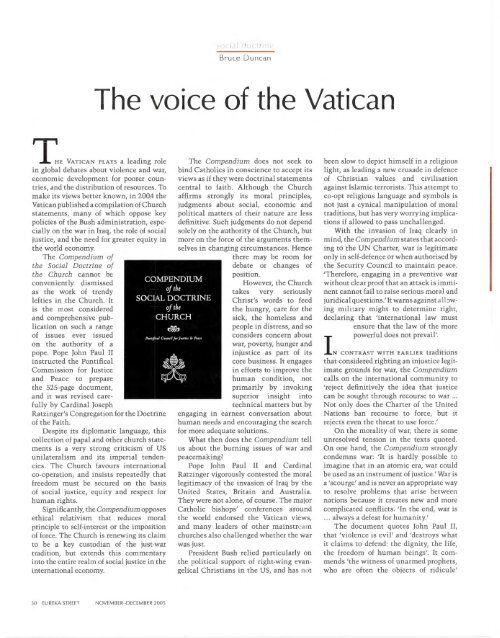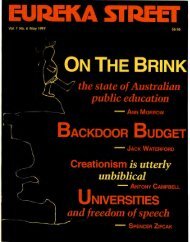0 - Eureka Street
0 - Eureka Street
0 - Eureka Street
You also want an ePaper? Increase the reach of your titles
YUMPU automatically turns print PDFs into web optimized ePapers that Google loves.
Bruce Duncan<br />
The voice of the Vatican<br />
T" VAnCAN eCAYS' !ceding mk<br />
in global debates about violence and war,<br />
economic developm ent for poorer countries,<br />
and the distribution of resources. To<br />
m a ke its views better known, in 2004 the<br />
Vatican published a compilation of Church<br />
statem ents, m any of which oppose key<br />
policies of the Bush administration, especially<br />
on the war in Iraq, the role of social<br />
justice, and the need for greater equity in<br />
the world economy.<br />
The Compendium of<br />
the Social Doctrine of<br />
the Church cannot be<br />
conveniently dismissed<br />
as the work of trendy<br />
lefties in the Church. It<br />
is the most considered<br />
and comprehensive publication<br />
on such a range<br />
of issues ever issued<br />
on the authority of a<br />
pope. Pope John Paul II<br />
instructed the Pontifical<br />
Commission for Justice<br />
and Peace to prepare<br />
the 525-page document,<br />
and it was revised carefully<br />
by Cardinal Joseph<br />
Ratzi nger's Congregation for the Doctrine<br />
of the Faith.<br />
Despite its diplomatic language, this<br />
collection of papal and other church statements<br />
is a very strong criticism of US<br />
unilateralism and its imperial tendencies.<br />
The Church favo urs international<br />
co-operation, and insists repeatedly that<br />
freedom must be secured on the basis<br />
of social justice, equity and respect for<br />
human rights.<br />
Significantly, the Compendium opposes<br />
ethical relativism that reduces moral<br />
principle to self-interest or the imposition<br />
of force. The Church is renewing its claim<br />
to be a key custodia n of the just-war<br />
tradition, but extends this commentary<br />
into the entire realm of social justice in the<br />
international economy.<br />
The Compendium does not seek to<br />
bind Catholics in conscience to accept its<br />
views as if they were doctrinal statem ents<br />
central to faith. Although the Church<br />
affirms strongly its moral principles,<br />
judgments about social, economic and<br />
political matters of thei r nature are less<br />
definitive. Such judgments do not depend<br />
solely on the authority of the Church, but<br />
more on the force of the arguments themselves<br />
in changing circumstances. Hence<br />
there may be room for<br />
debate or changes of<br />
position.<br />
However, the Church<br />
takes very seriously<br />
Christ's words to feed<br />
the hungry, care for the<br />
sick, the homeless and<br />
people in distress, and so<br />
considers concern about<br />
war, poverty, hunger and<br />
injustice as part of its<br />
core business. It engages<br />
in efforts to improve the<br />
human condition, not<br />
primarily by invoking<br />
superior insight into<br />
technical matters but by<br />
engaging in earnest conversation about<br />
human needs and encouraging the search<br />
for more adequate solutions.<br />
What then does the Compendium tell<br />
us about the burning issues of war and<br />
peacemaking<br />
Pope John Paul II and Cardinal<br />
Ratzinger vigorously contested the moral<br />
legitimacy of the invasion of Iraq by the<br />
United States, Britain and Australia.<br />
They were not alone, of course. The major<br />
Catholic bishops' conferences around<br />
the world endorsed the Vatican views,<br />
and many leaders of other mainstream<br />
churches also challenged whether the war<br />
was just.<br />
President Bush relied particularly on<br />
the political support of right-wing evangelical<br />
C hristia ns in the US, and has not<br />
been slow to depict himself in a religious<br />
light, as leading a new crusade in defence<br />
of Christian va lues and civilisation<br />
against Islamic terrorists. This attempt to<br />
co-opt religious language a nd symbols is<br />
not ju st a cynical m anipulation of moral<br />
tradition s, but has very worrying irnplications<br />
if allowed to pass unchallenged.<br />
With the invasion of Iraq clearl y in<br />
mind, the Compendium states that according<br />
to the UN Charter, war is legitim ate<br />
only in self-defence or when authorised by<br />
the Security Council to maintain peace.<br />
'Therefore, engagin g in a preventive war<br />
w ithout clear proof that an attack is imminent<br />
cannot fail to raise serious moral and<br />
juridical questions.' It warns against allowing<br />
m ilitary might to determine right,<br />
declaring that 'international law must<br />
ensure that the law of the more<br />
powerful does not prevail'.<br />
I<br />
that considered righting an injustice legitimate<br />
grounds for war, the Compendium<br />
calls on the international community to<br />
'reject definitively the idea that justice<br />
can be sought through recourse to war .. .<br />
N ot only does the Charter of the United<br />
Nations ban recourse to force, but it<br />
rejects even the threat to u e force.'<br />
On the morality of war, there is some<br />
unresolved tension in the texts quoted.<br />
On one hand, the Compendium strongly<br />
condemns war: 'It is hardly possible to<br />
imagine that in an atomic era, war could<br />
be used as a n instrument of justice.' War is<br />
a 'scourge' and is never an appropriate way<br />
to resolve problems that arise between<br />
nations because it creates new and more<br />
complicated conflicts. 'In the end, war is<br />
... always a defeat for humanity.'<br />
The document quotes John Paul II,<br />
that 'violence is evil' and 'destroys what<br />
it claims to defend: the dignity, the life,<br />
the freedom of human beings'. It commends<br />
'the witness of unarmed prophets,<br />
who arc often the objects of ridicule'<br />
N CONTRAST WITH EARLIER traditions<br />
10 EURE KA STREET NOVEMBER-DECEM BER 2005
















